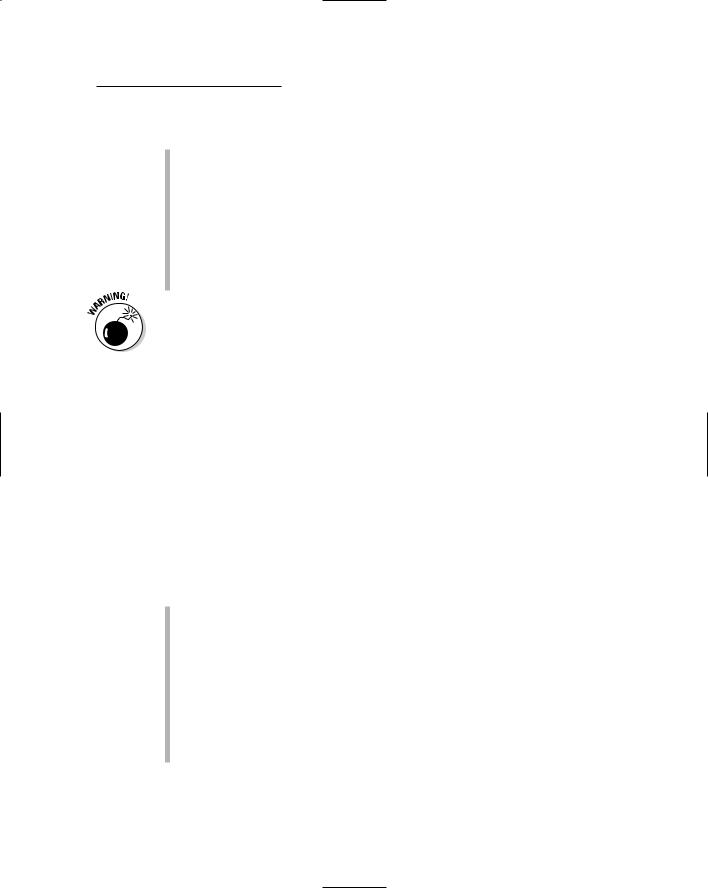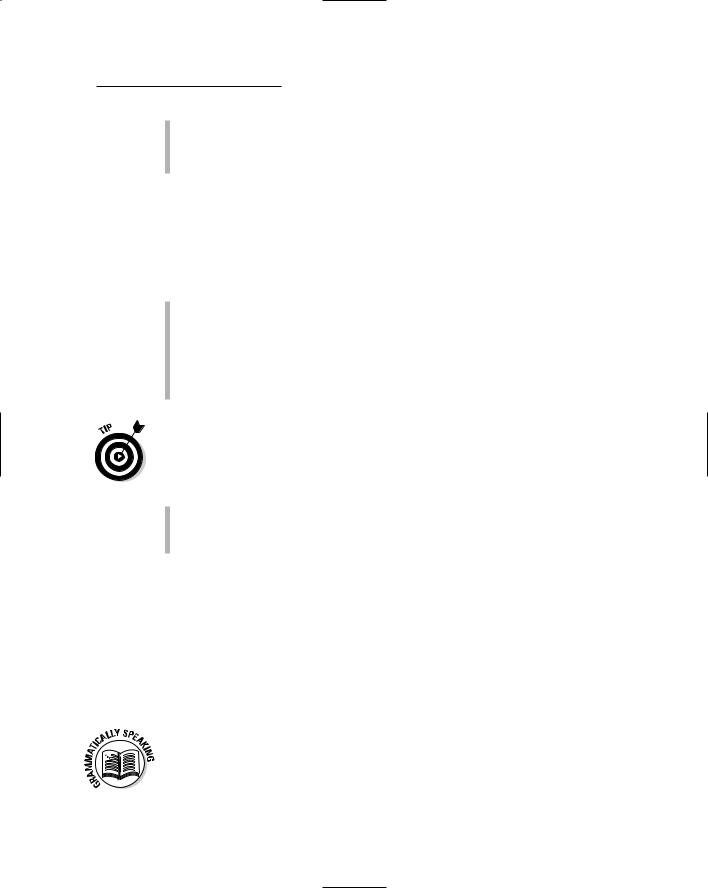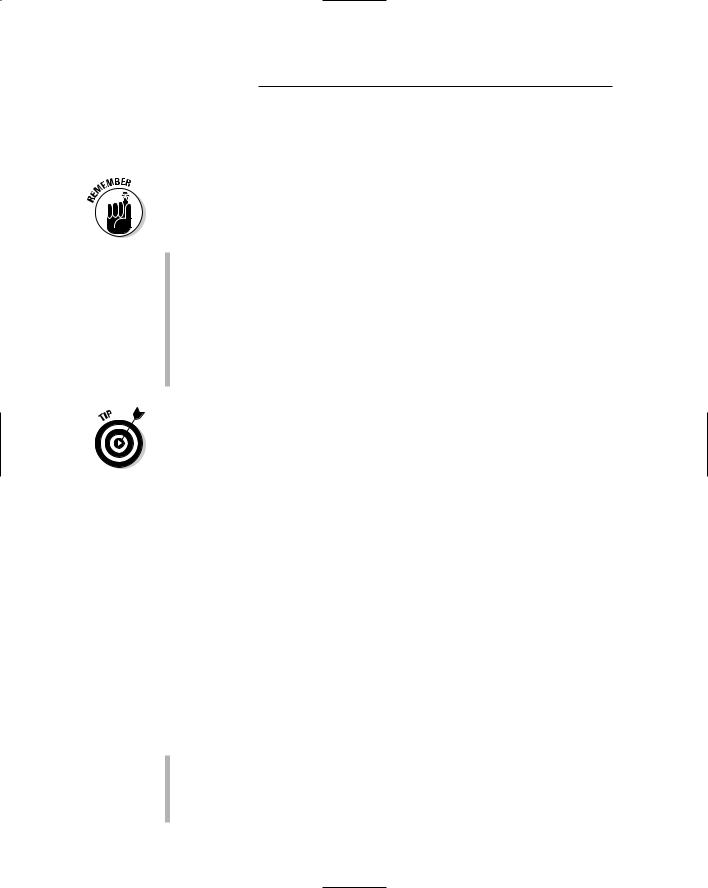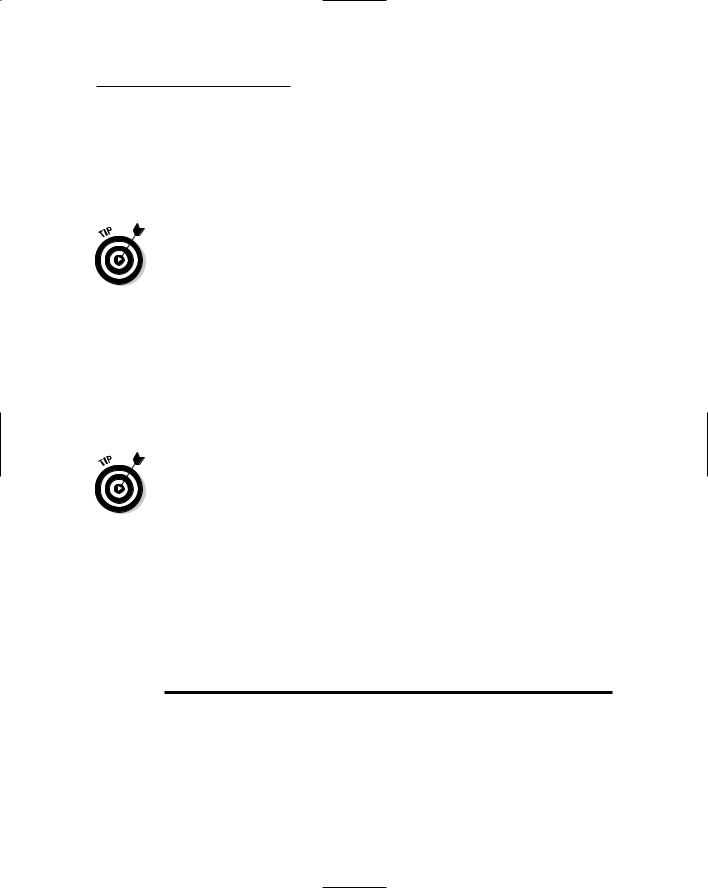
Russian For Dummies
.pdf
174 Part II: Russian in Action
Lying around at Lake Baikal
With its picturesque cliffs, numerous islands, and crystal clear water, Ozyero Baikal (oh-zee-ruh buhy-kahl; Lake Baikal) is an unforgettable vacation spot. It’s a little way off the beaten path — a direct flight from Moscow to Irkutsk, the nearest big city in the Baikal area, is five and a half hours long.
If you decide to embark on this adventure, having these words at your disposal makes your experience easier:
byeryeg (bye-reek; shore)
plyazh (plyash; beach)
ryechnoj vokzal (reech-nohy vahk-zahl; port)
katyer (kah-teer; boat)
parom (puh-rohm; ferry)
prichal (pree-chahl; pier)
pristan’ (prees-tuhn’; loading dock)
ostrov (ohs-truhf; island)
bajdarka (buhy-dahr-kuh; kayak)
rybalka (rih-bahl-kuh; fishing)
lovit’ rybu (lah-veet’ rih-boo; to fish)
plavat’ (plah-vuht’; to swim)
komary (kuh-muh-rih; mosquitoes)
Taking a cruise ship down the Volga River
If you feel like enjoying some Russian waterways, but a flight all the way to Irkutsk just doesn’t find its way into your schedule, a river cruise down the Volga River is an easily arranged alternative. You can get on a tyeplokhod (teep-lah-khoht; cruise ship) in any major city in Russia, including Moscow. Now, just grab a comfortable chair, relax na palubye (nuh pah-loo-bee; on the deck), and watch centuries of Russian history go by!
The Volga River has always been in the center of Russian history. The oldest cities, churches, and monasteries are located on its banks. In Russian folk songs and fairytales, the Volga is often called matushka (mah-toosh-kuh), which is an affectionate word for mother.

Chapter 8: Enjoying Yourself: Recreation and Sports 175
Each Volga traveler should know these words:
ryeka (ree-kah; river)
ryechnoj kruiz (reech-nohy kroo-eez; river cruise)
kayuta (kuh-yu-tuh; ship cabin)
ekskursiya (ehks-koor-see-ye; excursion)
ekskursovod (ehks-koor-sah-voht; tour guide)
gid (geet; tour guide)
monastyr’ (muh-nuh-stihr’; monastery)
When talking about the Volga River, you may run into confusion: Volga is not only Russia’s most famous river, but also its most popular car!
Doing Things with Your Hands
Exploring natural wonders and architectural gems is fun, but so is discovering your internal treasures. In the following sections, find out how to talk about nifty things you can do with your hands. Don’t be shy; your talant (tuh- lahnt; talent) deserves to be talked about.
Being crafty
If you’re one of those lucky people who can create things with your hands, don’t hesitate to tell Russians about it! They’ll be very impressed. The following are some words you may want to know:
vyazat’ (veeh-zaht’; to knit)
shit’ (shiht’; to sew)
risovat’ (ree-sah-vaht’; to draw)
pisat’ maslom (pee-saht’ mahs-luhm; to paint)
lyepit’ (lee-peet’; to sculpt)
lyepit’ iz gliny (lee-peet’ eez glee-nih; to make pottery)
dyelat’ loskutnyye odyeyala (dye-luht’ lahs-koot-nih-ee uh-dee-ya-luh; to quilt)

176 Part II: Russian in Action
To ask someone whether he or she can do one of these crafts, use the verb umyet’ (oo-myet’; can) plus the infinitive:
Ty umyeyesh pisat’ maslom (tih oo-mye-eesh’ pee-saht’ mahs-luhm; Can you paint?; informal singular)
Vy umyeyetye vyazat’? (vih oo-mye-ee-tee vee-zaht’; Can you knit?; formal singular)
To answer these kinds of questions, you can say:
Da, ya umyeyu (dah ya oo-mye-yu; Yes, I can)
Nyet, ya nye umyeyu (nyet ya nee oo-mye-yu; No, I can’t)
Playing music
Do you like muzyka (moo-zih-kuh; music)? To talk about playing a muzykal’nyj instrumyent (moo-zih-kahl’-nihy een-stroo-myent; musical instrument), use the verb igrat’ (eeg-raht’; to play) + the preposition na (nah) and the name of the instrument in the prepositional case (for prepositional case endings, see Chapter 2).
Use the preposition na when you’re talking about playing a musical instrument. Unlike in English, missing a preposition in the sentence Ya igrayu na gitarye (ya eeg-rah-yu nuh gee-tah-ree; I play the guitar) makes it meaningless in Russian.
You can ask the following questions:
Ty umyeyesh’ igrat’ na . . . ? (tih oo-mye-eesh’ eeg-raht’ nah; Can you play . . . ?; informal) + the name of the instrument in the prepositional case
Vy umyeyetye igrat’ na . . . ? (vih oo-mye-ee-tee eeg-raht’ nah; Can you play . . . ?; formal and plural) + the name of the instrument in the prepositional case
Some musical instruments you may want to mention include the following:
pianino (pee-uh-nee-nuh; piano)
skripka (skreep-kuh; violin)
flyejta (flyey-tuh; flute)
klarnyet (kluhr-nyet; clarinet)
baraban (buh-ruh-bahn; drum)
gitara (gee-tah-ruh; guitar)

Chapter 8: Enjoying Yourself: Recreation and Sports 177
saksofon (suhk-sah-fohn; saxophone)
trombon (trahm-bohn; trombone)
truba (troo-bah; tuba)
Collecting Cool Stuff
If you’re a proud collection owner, read through this section to find out how to talk about your hobby. These words get you started:
kollyektsiya (kah-lyek-tsih-ye; collection)
kollyektsionyer (kuh-leek-tsih-ah-nyer; collector)
marki (mahr-kee; stamps)
monyeti (mah-nye-tih; coins)
antikvariat (uhn-tee-kvuh-ree-aht; antiques)
You can use two verbs to describe collecting something. One of them is recognizable, but rather cumbersome: kollyektsionirovat’ (kuh-leek-tsih-ah-nee- ruh-vuht’; to collect). Another is more Russian and a little shorter: sobirat’ (suh-bee-raht’; to collect). Here are some examples of something a collector may say:
Ya sobirayu marki (ya suh-bee-rah-yu mahr-kee; I collect stamps)
A chto vy kollyektsioniruyetue? (ah shtoh vih kuh-leek-tsih-ah-nee-roo- ee-tee; And what do you collect?)
Scoring with Sports
Whatever your relationship with sport is, this section equips you with the necessary tools to talk about it. To talk about playing sports, use the verb zanimat’sya (zuh-nee-maht’-sye; to engage in/to play a sport). The name of the sport after this verb should be in the instrumental case (see Chapter 2 for case details). The word for “sports” is sport (spohrt); it’s always singular.
Zanimat’sya is a reflexive verb. That means that at the end of it, you have a little -sya particle that remains there no matter how you conjugate the verb. This -sya particle is what remained of syebya (see-bya; oneself). The use of this particle directs the action onto the speaker. Thus, zanimat’sya means “to engage oneself.” The same verb without the -sya particle, zanimat’, means “to engage somebody else.” Reflexive verbs aren’t very numerous in Russian; we warn you whenever we come across them.

178 Part II: Russian in Action
To conjugate the verb zanimat’sya, think of it as consisting of two parts: the verb zanimat’ and -sya. Conjugate the verb zanimat’ as a regular verb. Then add the particle -sya to the end of each conjugated form, such as zanimayesh’sya (zuh-nee-mah-eesh’-sye; you engage in). If a conjugated form of the verb ends in a vowel, then -sya becomes -s’, such as in zanimayus’ (zuh- nee-mah-yus’; I engage in). For more on the conjugation patterns of regular verbs, see Chapter 2.
You can ask somebody Ty zanimayesh’sya sportom? (tih zuh-nee-mah-eesh- sye spohr-tuhm; Do you play sports? Literally: Do you engage in sports?) You can answer this question by saying one of two phrases:
Da, ya zanimayus’ . . . (dah ya zuh-nee-mah-yus’; Yes, I play . . .) + the name of the sport in the instrumental case
Nyet, ya ne zanimayus’ sportom (nyet ya nee zuh-nee-mah-yus’ spohr- tuhm; No, I don’t play sports)
If you’re talking about a team sport that can also be called an igra (eeg-rah; game), you can use the expression igrat’ v (eeg-raht’ v . . .; to play) + the name of the sport in the accusative case. For instance: Ty igrayesh’ v futbol? (tih eeg-rah-eesh’ f foot-bohl; Do you play soccer?)
Here’s a list of sports you may want to talk about:
baskyetbol (buhs-keet-bohl; basketball)
byejsbol (beeys-bohl; baseball)
futbol (foot-bohl; soccer)
vollyejbol (vuh-leey-bohl; volleyball)
tyennis (teh-nees; tennis)
gol’f (gohl’f; golf)
To talk about watching a game, you can use the verb smotryet (smaht-ryet’; to watch). For more information on this verb, see Chapter 7.
Talkin’ the Talk
Tom and Boris met at a party. Boris immediately starts talking about his favorite pastime, sports.
Boris: |
Ty zanimayesh’sya sportom? |
|
tih zuh-nee-mah-eesh’-sye spohr-tuhm? |
|
Do you play sports? |

|
|
Chapter 8: Enjoying Yourself: Recreation and Sports 179 |
|
|
|
||
|
Tom: |
Da, ya zanimayus’ tyennisom. A ty? |
|
|
|
dah, ya zuh-nee-mah-yus’ teh-nee-suhm. uh tih? |
|
|
|
Yes, I play tennis. What about you? |
|
|
Boris: |
A ya igrayu v futbol. Ty lyubish’ futbol? |
|
|
|
uh ya eeg-rah-yu f foot-bohl. tih lyu-beesh’ foot- |
|
|
|
bohl? |
|
|
|
I play soccer. Do you like soccer? |
|
|
Tom: |
Nye znayu. Ya nikogda nye vidyel igru. |
|
|
|
nee znah-yu. ya nee-kahg-dah nee vee-deel eeg-roo. |
|
|
|
I don’t know. I’ve never seen the game. |
|
|
Boris: |
Pravda? Togda davaj pojdyom na match “Spartak”– |
|
|
|
“Dinamo.” |
|
|
|
prahv-duh? tahg-dah duh-vahy pahy-dyom nuh |
|
|
|
mahch spahr-tahk dee-nah-muh. |
|
|
|
Really? Let’s go then to see a match between |
|
|
|
“Spartak” and “Dinamo.” |
|
|
Tom: |
Davaj! A kogda? |
|
|
|
duh-vahy! uh kahg-dah? |
|
|
|
Yes, let’s do it. And when? |
|
|
|
|
|
Words to Know
Nye znayu. |
nee znah-yoo |
I don’t know. |
Ya nikogda nye |
ya nee-kahg-dah |
I’ve never seen the |
vidyel igru. |
nee vee-deel eeg-roo |
game. |
Pravda? |
prahv-duh |
Really? |
Togda davaj |
tahg-dah duh-vahy |
Let’s go then to |
pojdyom na |
pahy-dyom nuh |
see a match. |
match. |
mahch |
|

180 Part II: Russian in Action
 Fun & Games
Fun & Games
Match the questions in the left column with the most likely answers on the right. The correct answers are in Appendix C.
1. Chto vy dyelayetye syegodnya vyechyerom?
a. Nyet, ya lyublyu tyennis.
2. |
Chto vi kollyektsionyruyetye? |
b. Ya budu doma. |
3. |
Vy igrayetye na pianino? |
c. Ya sobirayu marki. |
4. |
Vy lyubitye futbol? |
d. Nyet, na skripkye. |
Where are you most likely to see all these things? For each group, choose an answer from the list below. The correct answers are in Appendix C.
1.Knigi, zhurnaly, gazyety, otdyel audio i vidyeo matyerialov
2.Lyzhi, snoubordy, kanatka, gory
3.Katyer, ostrov, parom, baidarka
a. Ozyero Baikal b. Kavkaz |
c. knizhnij magazin |
What do they like to do? Look at this list of famous people and choose their favorite activities from the list on the right.
Vanessa Mae . . . |
lyubit pisat’ maslom |
Renoir . . . |
lyubit igrat’ na gitarye |
Michelangelo . . . |
lyubit pisat’ romany |
Tolstoy . . . |
lyubit igrat’ na skripkye |
Santana . . . |
lyubit lyepit’ |

Chapter 9
Talking on the Phone and Sending Mail
In This Chapter
Understanding phone basics
Making a phone call
Carrying on a phone conversation politely
Sending a variety of written correspondence
Telephones have become an indispensable part of our busy lives. Thanks to modern technology, we can now talk on the phone almost anywhere. In
this chapter, you discover the words and expressions you need when using a telephone. You find out basic phone vocabulary, such as different parts of the phone, and we provide you with the tips on how to start, conduct, and conclude your telephone conversations. We also tell you the basics of sending letters, e-mails, and faxes.
Ringing Up Telephone Basics
Before you find out how to make a call, knowing a little bit about the phone itself is helpful. In the following sections, we give you some basic vocabulary related to phones and describe the different types of phones and phone calls.
Brushing up on phone vocabulary
You need to know a number of important words associated with the use of the tyelyefon (tee-lee-fohn; telephone). When somebody wants to talk to you, he or she may want to zvonit’ (zvah-neet’; to call) you. The caller needs to nabirat’ (nuh-bee-raht’; to dial) your nomyer tyelyefona (noh-meer tee-lee- foh-nuh; telephone number), and when the call goes through, you hear a zvonok (zvah-nohk, ring).

182 Part II: Russian in Action
The main part of the telephone is the trubka (troop-kuh; receiver). On your landline, the trubka rests on the tyelyefonnyj apparat (tee-lee-fohn-nihy uh- puh-raht; the body of the phone).
You can do a lot of different things with the trubka. You can podnimat’ trubku (puhd-nee-maht’ troop-koo; to pick up the receiver), vyeshat’ trubku (vye-shuht’ troop-koo; to hang up the receiver), or klast’ trubku (klahst’ troop-koo; to put down the receiver). Other words related to phones include
knopka (knohp-kuh; button)
gudok (goo-dohk; beep, tone)
dolgij gudok (dohl-geey goo-dohk; dial tone, Literally: long tone)
korotkiye gudki (kah-roht-kee-ee goot-kee; busy signal, Literally: short tones)
kod goroda (koht goh-ruh-duh; area code)
tyelyefonnaya kniga (tee-lee-fohn-nuh-ye knee-guh; telephone book)
You also need to be able to give other people your phone number and to understand the phone numbers dictated to you. Usually, Russians give phone numbers in chunks. For instance, if your phone number is 123-45-67, you say it as sto dvadtsat’ tri, sorok pyat’, shyestdyesyat’ syem’ (stoh dvaht-tsuht’ tree, soh-ruhk pyat’, shees-dee-syat’ syem; one hundred twenty-three, fortyfive, sixty-seven).
Distinguishing different types of phones
Recent advances in technology have brought many different types of phones. In addition to the standard landline, or tyelyefon, most people today in Russia have sotovye tyelyefony (soh-tuh-vih-ee tee-lee-foh-nih; cellular phones), which are also called mobil’nye tyelyefony (mah-beel’-nih-ee tee-lee-foh-nih; mobile phones), trubki (troop-kee; Literally: receivers), or mobil’niki (mah-beel’-nee-kee; mobile phones). The singular forms of these words are sotovyj tyelyefon (soh-tuh-vihy tee-lee-fohn; cellular phone), mobil’nyj tyelyefon (mah-beel’-nihy tee-lee-fohn; mobile phone), trubka (troop-kuh; mobile phone, Literally: receiver) and mobil’nik (mah-beel’-neek; mobile phone).
Other specific types of phones include
diskovyj tyelyefon (dees-kuh-vihy tee-lee-fohn; rotary phone)
knopochnyj tyelyefon (knoh-puhch-nihy tee-lee-fohn; touch-tone phone)
byesprovodnoj tyelyefon (bees-pruh-vahd-nohy tee-lee-fohn; cordless phone)

Chapter 9: Talking on the Phone and Sending Mail 183
If you’re not at home and you don’t have a cell phone with you, look for what Russians call a tyelyefonnaya budka (tee-lee-fohn-nuh-ye boot-kuh; telephone booth), which is not always an easy task. Have you noticed that with the arrival of cellular phones, telephone booths have become an almost extinct species? Well, telephone booths were a dying species in Russia even before cell phones, mostly because the booth phones usually didn’t work!
Our recommendation: When in Russia, try to have a reliable cell phone with you at all times. You have to remember, though, that the cell phone you use at home may not work in Russia unless you purchase a special card to insert into it that enables you to use it abroad. Another way to solve the problem is to just get a new cell phone in Russia.
Knowing different kinds of phone calls
If you call somebody in your calling area, you make a myestnyj zvonok (myest-nihy zvah-nohk; local call), and you aren’t charged. If the person or institution you call is in a different city, you make a myezdugorodnyj zvonok (myezh-doo-gah-rohd-nihy zvah-nohk; long-distance call, Literally: intercity). If you want to call back home from Russia, you make a myezhdunarodnyj zvonok (myezh-doo-nuh-rohd-nihy zvah-nohk; international call).
Russia has no collect or operator-assisted calls. So when you’re in Russia and you want to make a call, be sure to have a Russian-speaking friend around!
Dialing It In and Making the Call
When you want to make a phone call, you can’t translate your desire into reality without first dialing the number of the person or institution you’re calling. In order to nabirat’ nomyer (nuh-bee-raht’ noh-meer; to dial the number), use a tsifyerblat (tsih-feer-blaht; dial-plate), which, in many Russian homes, is still rotary rather than a push button. To help you handle this task, we provide you with the conjugation of the verb nabirat’ in the present tense in Table 9-1.
Table 9-1 |
Conjugation of Nabirat’ |
|
Conjugation |
Pronunciation |
Translation |
ya nabirayu |
ya nuh-bee-rah-yu |
I dial or I am dialing |
|
|
|
ty nabirayesh’ |
tih nuh-bee-rah-eesh’ |
You dial or You are dialing |
|
|
(informal singular) |
|
|
|
(continued)
